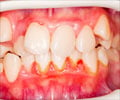Apparently there is some bad news waiting for those who do not brush their teeth at least twice a day!

Whose...... is the pearliest of them all? We have, on various occasions, witnessed celebrities and socialites flashing their 'pearly whites', and, many among us have even stopped to admire their healthy gleam!
It now appears that pearly whites are man’s best friends, as they not only add to his demeanor but to his ‘hearty’ life as well!
The heart-teeth link
It has always been emphasized that brushing teeth twice a day is vital for a healthy life but not many associated an active heart with gums and teeth!
Apparently there is some bad news waiting for those who do not brush their teeth at least twice a day!
According to a Scottish study published online on May 27, 2010 in British Medical Journal (BMJ) it has been established that inflammation in any body part, including mouth and gums, could lead to atherosclerosis.
About the study
Questions regarding oral health included how often they went to the dentist and how often they brushed their teeth. The medical history and family history of the participants, with special emphasis on heart disease and blood pressure, were collected.
Samples of blood were taken from a subgroup of participants and the level of C-reactive protein (CRP) and fibrinogen were tested.
What Emerged!
It was found that participants who were not too enthusiastic about brushing their teeth, i.e those individuals who brushed their teeth less than twice a day, had an increased risk (70%) of heart disease compared to those who made an effort to brush their teeth twice a day.
It was also discovered that those with poor oral hygiene had increased levels of CRP and fibrinogen, both of which are markers for coronary heart disease.
The How and Why
Periodontal disease, apparently, was brought about by systemic inflammation, raised homeostatic responses and disturbed lipid metabolism, which increased a person’s chances of heart disease.
Infection of the gums, referred to as gingivitis, is common in individuals with deplorable levels of oral hygiene. It is caused by the presence of gum disease –causing bacteria and leads to plaque and chronic inflammation which is manifested as swollen and bleeding gums and eventually tooth loss.
How does oral bacteria bring about heart disease? They enter the blood stream and when they reach the heart they cause inflammation which results in arterial blocks.
Chronic inflammation of the gums and periodontal disease have, for some time now, been associated with a greater risk of cardiovascular disease.
However, further studies are required to confirm if bad oral hygiene is indeed a cause of cardiovascular disease or if it is just a risk factor.
Lifestyle and Oral health
Oral health is integral to a healthy life. But this fact has been ignored, as body hygiene and oral hygiene do not usually go hand in hand.
Oral health impacts the physical and psychological well–being of a person and affects a person’s quality of life.
In developed countries oral health is a common but an expensive public health issue while in the developing countries the common man is ignorant or does not receive adequate treatment, and an accumulation of untreated diseases are commonly observed.
Children with caries are particularly affected, as poor oral health affects their nutrition, weight gain, growth and sleep patterns.
Chronic diseases and oral health
In developing nations, chronic diseases such as obesity, diabetes and caries are on a steady rise. This indicates that oral health, along with the overall quality of life, will be on a decline.
Diabetics are more prone to infection and it is precisely for this reason that they are more likely to have periodontal disease than non- diabetes. Actually, oral disease can make it difficult for people to control their blood sugar levels.
Oral and chronic diseases have common triggers and it is on this fact that more emphasis must be laid to bring about a change.
Decisive factors
Some of the decisive factors for a decline in oral health seem to be common with those for chronic illnesses. They include–
Tips









